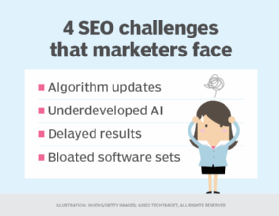
Getty Images
Top 4 SEO marketing challenges for 2023
An organization's content must rank well on Google to drive website traffic. Yet, SEO marketers face barriers to this success, such as algorithm changes and underdeveloped AI.
BOSTON -- Content marketers often struggle to keep up with the Google algorithm that can make or break their efforts, which makes search engine optimization a challenge.
SEO strategy was among the top concerns for marketers at HubSpot's Inbound 2022 user conference. People rely on search engines to find the content they want, and webpages that rank on the first search results page for a keyword phrase can receive a lot of traffic. Marketers must understand how to optimize their content for search engines if they want to improve their page rankings.
Key SEO challenges that marketers face include algorithm changes, underdeveloped AI, slow results and too many tools.
1. Google algorithm changes
Google changes its search algorithm multiple times per year, which can affect organizations' website traffic. The changes typically reward high-quality content relevant to its main keyword phrase. However, the algorithm evaluates many variables -- including content links, site speed and content thoroughness -- and many marketers that attended Inbound said they have struggled to keep up with the changes.
"From March until now, we've seen a 20% drop in organic traffic across all our clients, which is a little concerning," said Gracie DeSantis, an inbound marketing specialist at Vye marketing agency. "It's like, 'Is it something we're doing as an agency?' I think a lot of it is the [algorithm] updates."
Marketing teams can't control the Google algorithm, but they can control how they respond to it. Organizations looking to improve their SEO strategies should not only stay on top of what Google publicly says about its algorithm but also build a strong brand to develop authority in their markets.
In a session called "What's Next: How to Navigate Marketing Around Search and Social Algorithms," Neil Patel, co-founder of NP Digital marketing agency, explained that Google's algorithms favor established brands, and therefore, marketers should view brand-building as an SEO strategy.
To build a strong brand, organizations can offer free online tools, Patel said. Free tools, such as plagiarism checkers or calorie calculators, tend to generate a lot of brand queries on Google from people that want to use the tool, and this can boost an organization's brand authority and SEO ranking.
2. Artificial intelligence
Almost every industry uses AI in some way, and marketing is no exception. Although AI-powered SEO tools can help marketers find alternate keywords and generate anchor text variations, they often struggle to produce complex content on their own.
"It's hard to get AI to write an entire article nowadays, because [the technology] is just not there yet," said Dale Bertrand, founder and president of Fire&Spark marketing agency. "What we've found is it will just go off in the wrong direction."
Despite its inability to write full articles, AI can still help writers create content. For instance, it can generate title tags, subheads and other bits of content that writers can edit, add to and build on.
"It used to be that whenever I wrote an article, I would choose a keyword, write an outline, then write the article," Bertrand said. "Now, I prompt a tool with a keyword, and then it suggests more keywords and questions that I should be using in my headings, and it will suggest sentences and paragraphs. Then I have to have a human edit it."
Additionally, marketing teams can use AI to generate what Bertrand calls "efficient content." That could include comparison pages, templates or FAQs, where the AI can do a better job generating that type of content, Bertrand said.
3. Slow results
SEO strategies can help organizations increase site traffic, but results can take months to manifest. These strategies involve many factors, such as content quality and quantity, page authority and site UX -- all of which take time to develop.

Business leaders often underestimate how long they must wait to see traffic improvements, said Cole Godsey, senior marketing manager at 121eCommerce, an agency that helps clients build e-commerce websites. Results usually take at least three months to appear, Godsey said.
Marketers must commit to a long-term SEO strategy and not let slow results discourage them. They should invest time and resources into building a library of high-quality content, specifically tailored to their audience's needs. Additionally, to grow site authority, organizations can acquire backlinks -- instances where one website links to another -- from other sites that Google deems trustworthy.
4. Too many tools
SEO tools can streamline processes such as keyword research, but an overabundance of tools can hinder productivity. For example, an SEO strategist may use one tool for keyword research, one for performance tracking and another for web crawling. When software stacks include too many siloed tools, users may experience frustration as they toggle between the various apps.
"It can be overwhelming," Godsey said. "One of the things that I've had to do over the years is pare down all the resources I'm using."
To optimize an SEO software stack, marketing leaders should first identify any feature duplication. For example, an organization may pay for a standalone keyword research tool but also have a web crawler tool with its own keyword research capabilities. In this case, marketing leaders could eliminate the standalone tool. Also, marketers may choose to replace all or most of their siloed tools with an SEO software suite to improve their software set's UX.
Over time, search engine algorithms have become increasingly sophisticated and more difficult to manipulate with shortcuts such as keyword stuffing. For success, marketers must keep up with algorithm changes, create high-quality content and build their brand authority. AI tools can help streamline the content creation process, but editors must steer them in the right direction. Additionally, SEO marketers should develop a long-term strategy and optimize their SEO software set.







